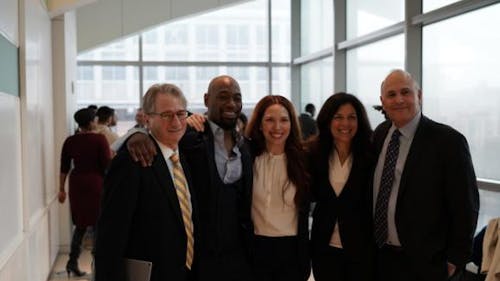Rutgers Law School clinic helps to exonerate man's wrongful murder conviction

Huwe Burton, who had no previous criminal record, was only 16 years old when he was wrongfully convicted of murdering his mother exactly 30 years ago.
For approximately 10 years, students and attorneys in Rutgers—Newark Law’s Criminal and Youth Justice Clinic worked to absolve him from the conviction, according to Rutgers Today.
Last month, in a hearing on Jan. 24, Bronx Supreme Court Justice Steven Barrett finally annulled Burton’s conviction and dismissed the case. Due to newly discovered evidence showing that Burton falsely confessed to the murder, Barrett was able to make his decision.
The exoneration was due to the collaboration with Laura Cohen, the director of the clinic, her students, Steven Drizin, a professor at Northwestern University, Barry Scheck and Susan Friedman from the Innocence Project and the Conviction Integrity Unit of the Bronx District Attorney’s Office.
During his hearing, Burton thanked the students and attorneys who helped to vacate his case. “I could not have made it here by myself,” he said to the judge and spectators in the courtroom.
Suzanne Hoyes and Adrienne V. Hawkins, both former students at Rutgers Law School, came to the hearing and said they remembered working on the case while in school.
“To this day I feel like the work I did on Huwe’s case and in the clinic was my most meaningful experience at Rutgers Law,” Hoyes said. She is currently a chief compliance officer for an investment management firm in Chicago. “The justice due to Huwe came after decades and decades of doggedly fighting and I was grateful to be a small part of that fight.”
The Criminal and Youth Justice Clinic was first involved in 2009, when Drizin asked Cohen to join the legal team for Burton. Cohen and Drizin had also been working together on another juvenile false confession case, helping to exonerate David McCallum and Willie Stuckey in Brooklyn five years ago. At the time the clinic became involved, Burton had just been released on parole after serving for 20 years.
Drizin, Cohen and her students investigated the case for the following six years, finding evidence about an alternate suspect and also revealing that the three detectives who interrogated Burton had obtained false confessions previously from two other individuals.
When Darcel Clark was elected as the Bronx District Attorney in 2016, the evidence was used to begin the path to Burton’s exoneration. After her election, Clark established the Conviction Integrity Unit and was introduced to Drizin and Cohen by Scheck, who also became a part of the legal team.
The Conviction Integrity Unit helped to gain access to other evidence, which had previously been undisclosed, that confirmed Burton’s innocence. Based on this evidence, as well as advances in science understanding false confessions, Clark’s unit recommended that the indictment be dismissed against Burton.
“Working on the case seemed an uphill battle,” Hawkins said. “Huwe’s gracious spirit and positive outlook on life despite all that happened to him was inspiring.”
At the hearing, Cohen also spoke of how inspired she was by Burton.
“I and every student who has worked on this case over the years ... have been inspired and moved by his seemingly limitless patience and his steadfast determination to achieve justice, not only for himself but for his parents,” she said.
Working in the clinic had a huge impact on both Hawkins and Hoyes. Hawkins specifically said she took the values she learned from the clinic and applied it later to her job as a prosecutor in the Bronx District Attorney’s office.
“Compassion, humility and above all, a zealous search for the truth,” she said.
Burton had previously spoken to Rutgers Law students in 2017, before he was exonerated. He said he remembered being interrogated for hours by the police without an adult present and being told he would get leniency if he confessed.
“They may have hard exteriors but you don’t know how vulnerable they are on the inside. They’re scared,” he said.
Regarding advice for aspiring future lawyers, Burton said they should let their clients know that they will be fighting for them.
“You will be surprised how far you will take someone in spirit,” he said.



